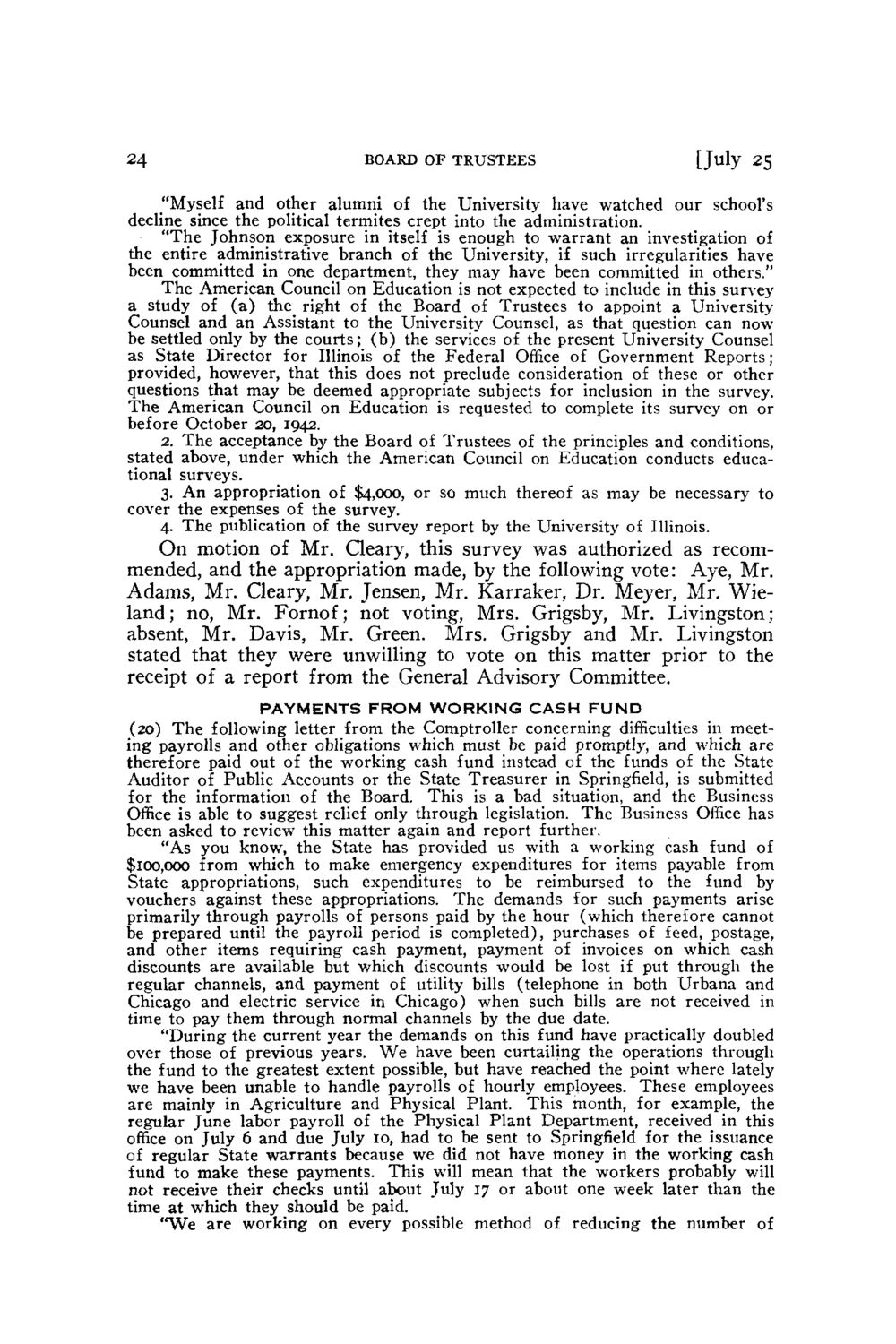| |
| |
Caption: Board of Trustees Minutes - 1944
This is a reduced-resolution page image for fast online browsing.

EXTRACTED TEXT FROM PAGE:
24 BOARD OF T R U S T E E S [July 25 "Myself and other alumni of the University have watched our school's decline since the political termites crept into the administration. " T h e Johnson exposure in itself is enough to warrant an investigation of the entire administrative branch of the University, if such irregularities have been committed in one department, they may have been committed in others." The American Council on Education is not expected to include in this survey a study of ( a ) the right of the Board of Trustees to appoint a University Counsel and an Assistant to the University Counsel, as that question can now be settled only by the courts; ( b ) the services of the present University Counsel as State Director for Illinois of the Federal Office of Government Reports ; provided, however, that this does not preclude consideration of these or other questions that may be deemed appropriate subjects for inclusion in the survey. T h e American Council on Education is requested to complete its survey on or before October 20, 1942. 2. T h e acceptance by the Board of Trustees of the principles and conditions, stated above, under which the American Council on Education conducts educational surveys. 3. An appropriation of $4,000, or so much thereof as may be necessary to cover the expenses of the survey. 4. The publication of the survey report by the University of Illinois. O n motion of M r . Cleary, this survey was authorized as recommended, and the appropriation made, by the following vote: Aye, Mr. A d a m s , Mr. Cleary, Mr. Jensen, Mr. K a r r a k e r , Dr. Meyer, M r . W i e l a n d ; no, M r . F o r n o f ; not voting, M r s . Grigsby, M r . Livingston; absent, M r . Davis, M r . Green. M r s . Grigsby and Mr. Livingston stated that they w e r e unwilling to vote on this matter prior to the receipt of a report from the General Advisory Committee. PAYMENTS FROM WORKING CASH F U N D (20) T h e following letter from the Comptroller concerning difficulties in meeting payrolls and other obligations which must be paid promptly, and which are therefore paid out of the working cash fund instead of the funds of the State Auditor of Public Accounts or the State Treasurer in Springfield, is submitted for the information of the Board. This is a bad situation, and the Business Office is able to suggest relief only through legislation. T h e Business Office has been asked to review this matter again and report further. "As you know, the State has provided us with a working cash fund of $100,000 from which to make emergency expenditures for items payable from State appropriations, such expenditures to be reimbursed to the fund by vouchers against these appropriations. T h e demands for such payments arise primarily through payrolls of persons paid by the hour (which therefore cannot be prepared until the payroll period is completed), purchases of feed, postage, and other items requiring cash payment, payment of invoices on which cash discounts are available but which discounts would be lost if put through the regular channels, and payment of utility bills (telephone in both Urbana and Chicago and electric service in Chicago) when such bills are not received in time to pay them through normal channels by the due date. "During the current year the demands on this fund have practically doubled over those of previous years. W e have been curtailing the operations through the fund to the greatest extent possible, but have reached the point where lately we have been unable to handle payrolls of hourly employees. These employees are mainly in Agriculture and Physical Plant. This month, for example, the regular J u n e labor payroll of the Physical Plant Department, received in this office on July 6 and due July 10, had to be sent to Springfield for the issuance of regular State warrants because we did not have money in the working cash fund to make these payments. This will mean that the workers probably will not receive their checks until about July 17 or about one week later than the time at which they should be paid. " W e are working on every possible method of reducing the number of
| |